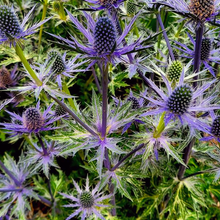Eryngium 'Big Blue' is a bold architectural perennial prized for its intense steel blue flowers and deeply serrated bracts. Its upright form, striking texture, and long bloom time make it a favorite in pollinator gardens and modern landscapes.
Height & Spread: 28 - 36 in x 18 - 24 in
Bloom Time: Midsummer to early fall
Light Requirements: Full sun
Soil Preference: Well drained, sandy or rocky soil
Watering Needs: Low; drought tolerant once established
Deer Resistance: Highly deer resistant due to spiny texture
Native Status
This hybrid cultivar is derived from Eurasian Eryngium species and is not native to North America, though it performs well in similar dry open habitats.
WILDLIFE & INSECTS
Bees
- Attracts a wide variety of native solitary bees and honeybees drawn to its abundant nectar and open structure.
Butterflies
- Visited by swallowtails and Painted Ladies, which are drawn to its vibrant color and long bloom duration.
Spacing & Landscape Use
Spacing Recommendations
- Space 18 - 24 in apart to showcase individual forms while allowing airflow and structural integrity.
Landscape Placement
- Ideal for dry borders, gravel gardens, meadows, and xeriscapes. Makes an excellent cut or dried flower and adds bold texture to wildlife plantings.
Companion Plants
- Achillea millefolium (Yarrow) - Shares similar dry soil tolerance and offers a soft contrast in form and color.
- Lavandula angustifolia (English Lavender) - Enhances the blue tones of Eryngium and contributes fragrance and pollinator support.
- Stachys byzantina (Lambs Ear) - Offers silver foliage and a low profile to highlight Eryngium’s upright spikes.
- Perovskia atriplicifolia (Russian Sage) - Adds loose, airy texture and lavender blue flowers that echo the tones of ‘Big Blue.’
- Agastache foeniculum (Anise Hyssop) - Provides vertical purple blooms and strong bee appeal in the same hot, dry conditions.



